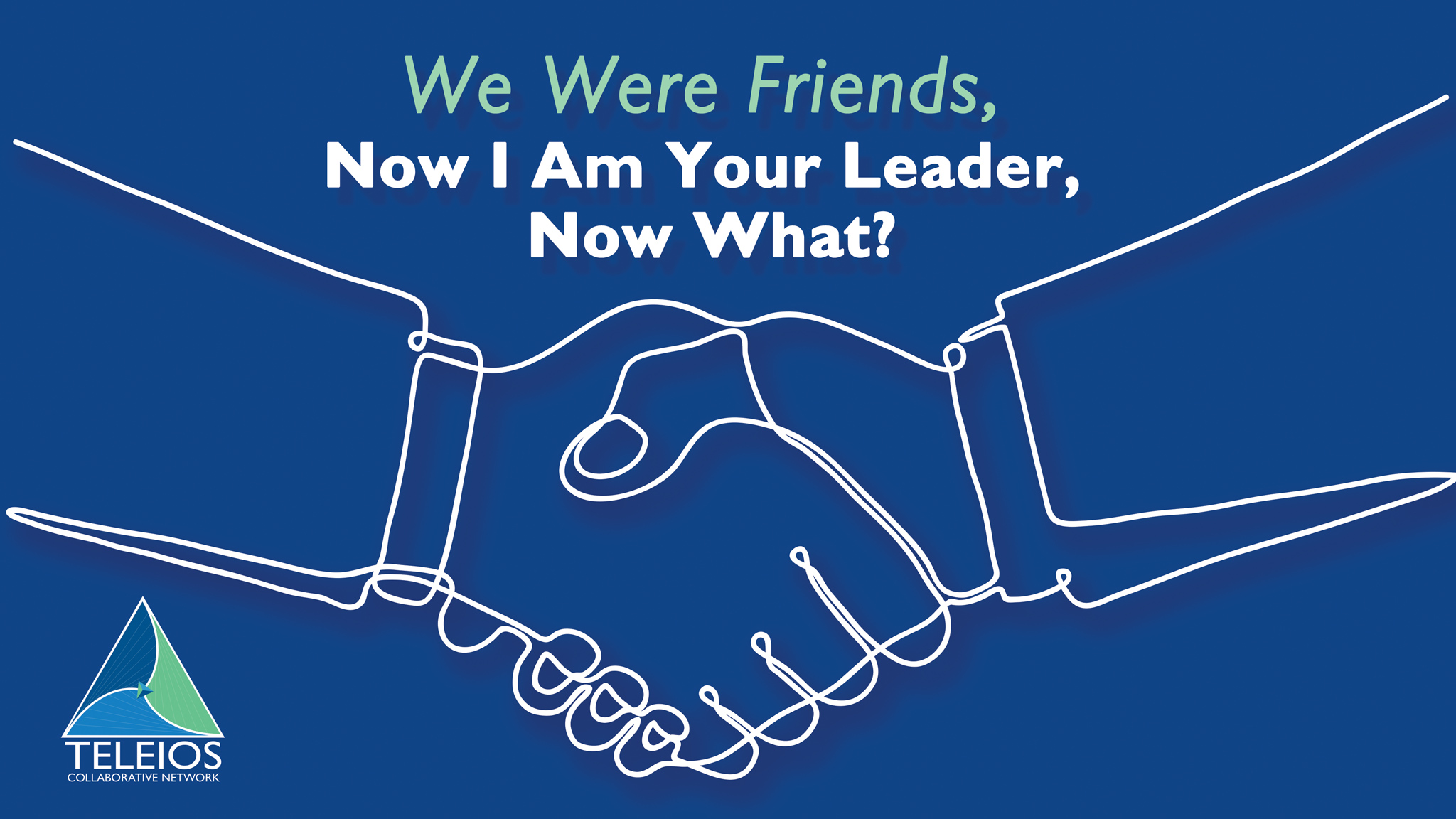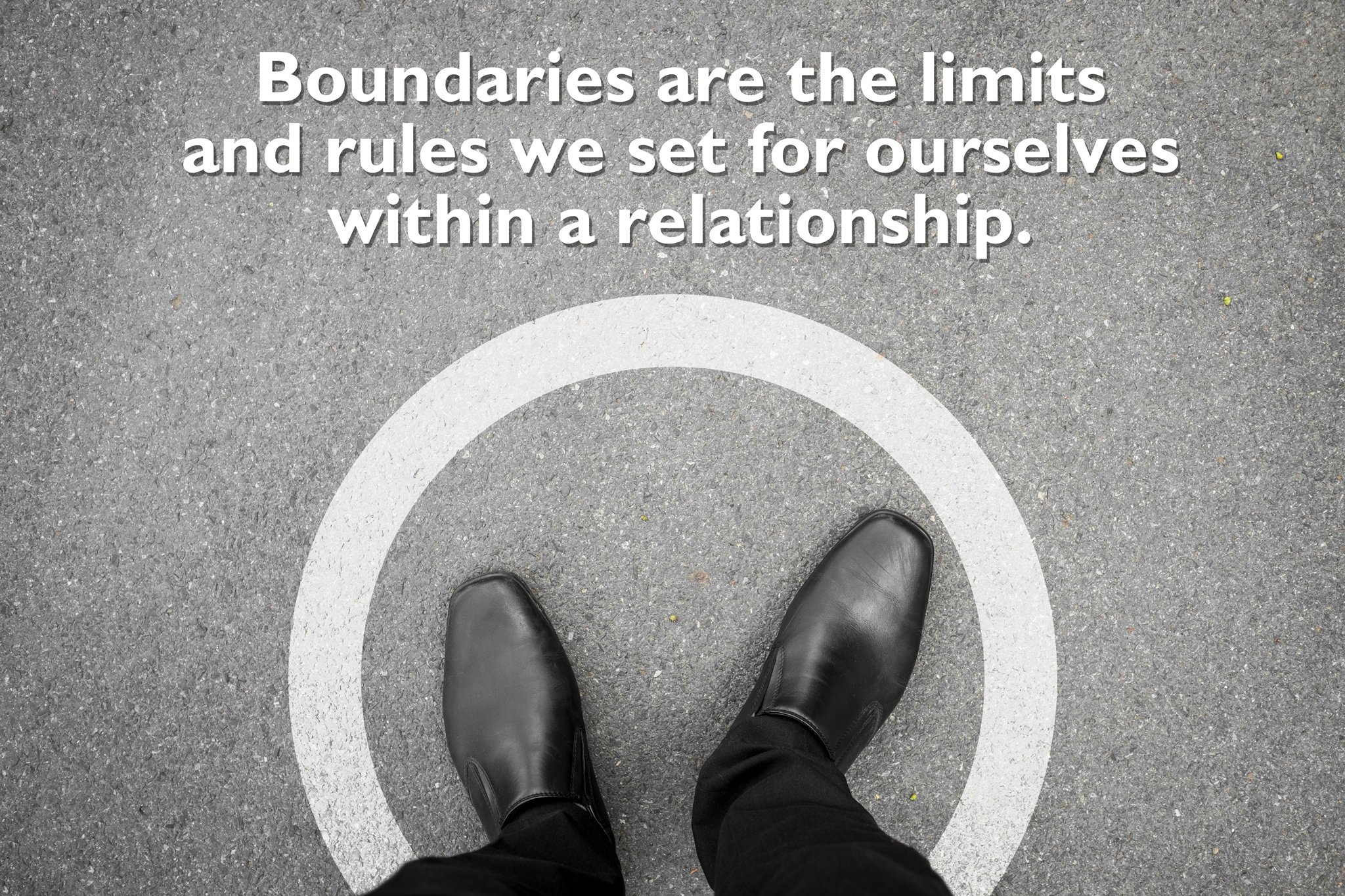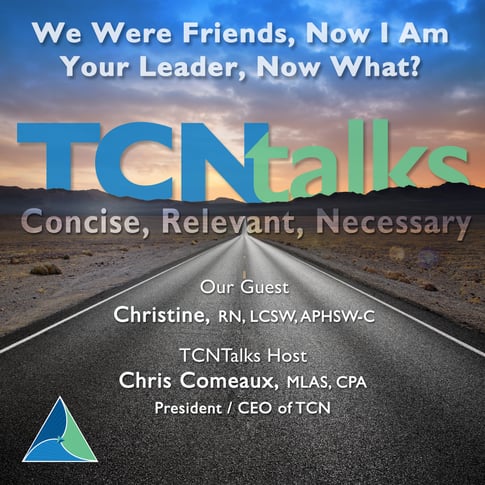12 min read
We Were Friends, Now I Am Your Leader, Now What? Part 2
By: Christine Lau on 5/28/21 10:05 AM

Now what, indeed! We have explored this topic in our podcast and in Chris Comeaux’s part one of this blog. I encourage you to look at these resources for more background.
In this blog the focus will be on practical application for how to address the situation of your friend becoming your direct-report – and vice versa. This is hard, and there is no way around the reality that it will change the dynamics of your relationship. This does not negate what was – you are the same people as before, with a real friendship – yet your roles have changed at work and your relationship must now evolve to accommodate this new state. Can you still be friends? That is dependent on whether each of you are willing to address the changes to your roles and have agreement on how to move forward.
We often think of role descriptions only in terms of our work life, but as Chris mentioned in part one of this blog, they can be beneficial in our personal life too. One of the things that a role description can help us to accomplish in our personal life is the establishment of boundaries. Gaining agreement on what the boundaries will be in your work and personal relationships moving forward will be important to successfully navigate the future.
Boundaries are the limits and rules we set for ourselves within a relationship. Boundaries can be rigid, porous, or healthy. Rigid boundaries are those that don’t allow others in, avoid asking for help and limit personal relationships. Porous boundaries are the extreme opposite, with oversharing of information, dependence on the opinions of others for self-acceptance, and an inability to say ‘no.’ Healthy boundary allows for saying ‘no’ to others when you want to, accepting and respecting when others say ‘no,’ and being able to open yourself up to close relationships.

We are usually a mix of these boundary types, and we may even show up differently depending on the setting. This becomes challenging when we have someone in our life in more than one setting, and the relationship becomes blurred. Having an open discussion together about what a healthy boundary would be between your work relationship and your personal friendship is the first step to navigating this situation. This might feel awkward, yet having this kind of transparent conversation conveys that you value the friendship and want to find a way forward that honors the friendship and the new role at work. Coming together to create a new role description for your friendship is a great exercise to sort out the boundaries between your personal friendship and your work relationship. Have your work role descriptions available for reference as you discuss what these new ground rules should be, some examples of ground rules are 1) not talking about work when you are not at work and 2) agreeing that work information will be shared with the entire staff, in the same way, at the same time – with a discussion of the importance of there not being even the appearance of favoritism at work. There will be other ground rules that you will need to establish together that will flow naturally from the discussion. The danger of not having this open conversation is the likelihood of misunderstanding and assumptions, which will inevitably put a strain on the friendship and the impact your team at work If you are the leader at work, it is your responsibility to ensure that there is congruency between your role and boundaries at work and your personal friendship. Without this congruency you will not be able to fulfill both roles successfully and with integrity. This is also why the onus for these discussions ultimately lies with the person in the leadership position.
Here is the hard part – you and your friend might not agree on what the new ground rules need to be, or you/your friend may not be willing to shift the boundaries and roles of your personal friendship to accommodate the new roles at work. If that is the case, you will both still have benefitted from the open and honest discussion. It will be what enables a mutual and intentional decision to either move forward in your friendship at the same intensity and depth, or to shift the friendship given your differing needs around boundaries and roles. Through the process you will have avoided the sad awkwardness of ‘drifting apart,’ or the painful (and potentially destructive) drama of a ’falling out.’
The reality is that your friendship must evolve, it is also a reality that this is common. Friendships evolve for a variety of reasons: like when there is a marriage, birth of children, relocation or becoming empty nesters. A change in work roles is just another catalyst for friendships to evolve, though one that requires more intention and proactivity than the others. It could evolve to a stronger and deeper personal friendship in the face of navigating the change of roles at work – or it may not, in the same way that some friendships come to a natural conclusion coinciding with other life events (ex. not all my friends from college were the same friends when raising kids, etc). The value of friendship is not always the length of the relationship, but the depth of the friendship. Sometimes important relationships are shorter than anticipated, but no less real. If through this process it becomes clear that your friendship is reaching its conclusion, this deserves to be acknowledged and likely grieved. Either way, the respectful and responsible thing to do is to be proactive and have these open and honest discussions together regarding boundaries and roles.
Christine Lau, RN, LCSW, APHSW-C
VP of Serious Illness Operations and Care Management
WANT TO IMPROVE YOUR LEADERSHIP SKILLS?
attend our LEADERSHIP IMMERSION
October 4-6, 2021
We invite you to listen to our TCNtalks Podcast

An organizational model that allows not-for-profit hospices (Members) to leverage best practices, achieve economies of scale and collaborate in ways that better prepare each agency to participate in emerging alternative payment models and advance their charitable missions.
Related Posts
We Were Friends, Now I Am Your Leader, Now What?
Recently in TCN Talks podcast, I interviewed Christine Lau, RN, LCSW, APHSW-C, about the challenge...
Cyber Threats: Important Protections to Implement Now
One of the biggest worries hospices face today is the threat of a cyberattack. The healthcare...
To Play or Not to Play A Role
One of Shakespeare’s most infamous lines is, “All the world’s a stage.” Many may read his flair for...



